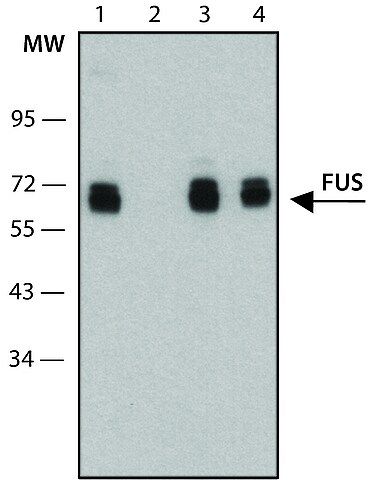您的位置:首页 > 产品中心 > Anti-FUS (internal region) antibody produced in rabbit
Anti-FUS (internal region) antibody produced in rabbit

产品别名
Anti-FUS (internal region) antibody produced in rabbit
Anti-heterogeneous nuclear ribonucleoprotein P2
Anti-translocated in liposarcoma protein
Anti-fused in sarcoma, ALS6, FUS1, POMP75, 75 kDa DNA-pairing protein
Anti-TLS
Anti-fusion gene in myxoid liposarcoma
Anti-HNRNPP2
Anti-fus-like protein
基本信息
| NACRES | NA.41 |
| General description【一般描述】 | Fused in sarcoma (FUS) is a component of heterogeneous nuclear ribonucleoprotein (hnRNP) complex. FUS gene is mapped to human chromosome 16p11.2. FUS is located predominantly in the nucleus. |
| Specificity【特异性】 | Anti-FUS (internal region) recognizes human FUS. |
| Immunogen【免疫原】 | peptide corresponding to an internal region of human FUS, conjugated to KLH. The corresponding sequence is identical in monkey and differs by 4 amino acids in rat and mouse. |
| Application【应用】 | Anti-FUS (internal region) antibody produced in rabbit may be used in:
|
| Biochem/physiol Actions【生化/生理作用】 | Fused in sarcoma (FUS), also called translocation in liposarcoma or Tumor lysis syndrome (TLS), plays a key role in RNA splicing, DNA repair and transcriptional regulation. It is a RNA/DNA binding protein implicated in various diseases. Mutations in the FUS gene is implicated in familial amyotrophic lateral sclerosis (FALS). Chromosomal translocation of FUS/TLS is found in human cancers and results in the production of oncogenic FUS fusion proteins. FUS has been implicated in a broadening spectrum of neurodegenerative disorders and is a component of inclusion bodies in patients with Huntington′s disease (HD) and spinocerebellar ataxias (SCA1) and SCA3. The majority of the FUS mutations have been identified in the C-terminal nuclear localization signal (NLS). TAR DNA-binding protein 43 (TDP-43) and FUS have been identified in amyotrophic lateral sclerosis (ALS), frontotemporal lobar degeneration (FLTD) and familial amyotrophic lateral sclerosis (FALS). Pathological FUS inclusions are mostly found in the cytosol of neurons and glial cells. |
| Physical form【外形】 | Solution in 0.01 M phosphate buffered saline pH 7.4, containing 15 mM sodium azide. |
产品性质
| biological source【生物来源】 | rabbit |
| Quality Level【质量水平】 | 200 |
| conjugate【偶联物】 | unconjugated |
| antibody form【抗体形式】 | affinity isolated antibody |
| antibody product type | primary antibodies |
| clone【克隆】 | polyclonal |
| form【形式】 | buffered aqueous solution |
| mol wt【分子量】 | antigen ~70 kDa |
| species reactivity | human |
| technique(s) | indirect immunofluorescence: 2.5-5.0 μg/mL using human HepG2 or MCF7 cells. western blot: 0.5-1.0 μg/mL using whole extracts of human HEK-293T or G361 cells. |
| UniProt accession no.【UniProt登记号】 | P35637 |
| shipped in【运输】 | dry ice |
| storage temp.【储存温度】 | −20℃ |
| Gene Information | human ... FUS(2521) |
产品说明
| Storage and Stability【储存及稳定性】 | For continuous use, store at 2-8℃ for up to one month. For extended storage freeze in working aliquots. Repeated freezing and thawing is not recommended. If slight turbidity occurs upon prolonged storage, clarify the solution by centrifugation before use. Working dilution samples should be discarded if not used within 12 hours. |
| Disclaimer【免责声明】 | Unless otherwise stated in our catalog or other company documentation accompanying the product(s), our products are intended for research use only and are not to be used for any other purpose, which includes but is not limited to, unauthorized commercial uses, in vitro diagnostic uses, ex vivo or in vivo therapeutic uses or any type of consumption or application to humans or animals. |
安全信息
| Storage Class Code【储存分类代码】 | 12 - Non Combustible Liquids |





